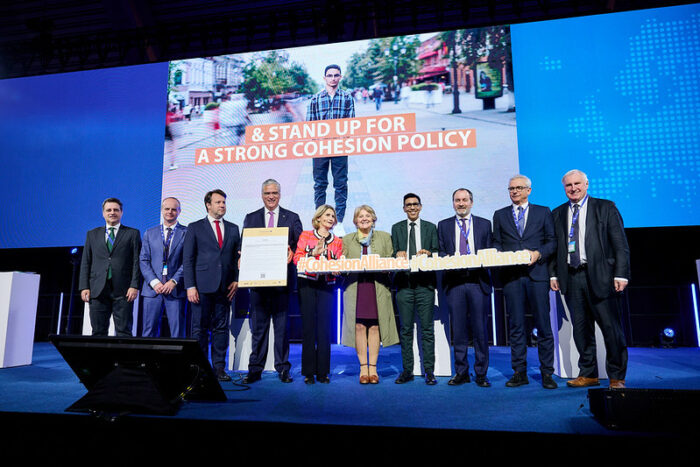The Progressive Post
A just transition in crisis mode

How do we manage to maintain a focus on long-term goals in times of crises? This is a question I ask myself these days a lot. When we look back, we see that crises have not broken Europe. On the contrary, it has grown closer together, identified new common tasks and acquired new competences.
Today we find the EU in multiple crises. The aftermath of the pandemic, the Russian war in Ukraine and the crisis of cost of living caused by high inflation hit a Europe with an ageing demographic, a shortage of skilled workers and a labour shortage in general. And yet, the Union has to master the task of the century: the industrial transition towards a climate-neutral economy alongside achieving strategic autonomy and greater sovereignty in the supply of energy and critical raw materials.
And, indeed, it does not all look so bright.
So, the question is: how can the EU manage the transition to a climate-neutral economy in the wake of the multiple crises? How can it further promote the cohesion of its regions and prevent them from drifting apart? I think this can only succeed if cohesion policy – our only long-term investment instrument – does much more in the future than redistributing funds. Today, the EU must promote cohesion and growth of its regions under entirely new conditions.
Cohesion policy as an all-rounder to combat the crises
Cohesion policy has proven to be an all-rounder, always ready to take up new tasks. Since 2020, we had several new instruments deriving from cohesion funds, such as the Corona Response Investment Initiative (CRII), and the follow-up CRII+, in response to the pandemic or the Cohesion’s Action for Refugees in Europe (CARE) and the Flexible Assistance for Territories (FAST-CARE) to support member states and regions in receiving Ukrainian refugees. The RePowerEU programme was also topped up with cohesion funds in response to the high energy prices, and the Act to Support Ammunition Production (ASAP) will also use cohesion funds. Currently, we are working on the Net Zero Industry Act (NZIA) and the Strategic Platform for Europe (STEP) to boost the settlement of green industries in Europe – here as well, cohesion funds will be used.
While all these newly created instruments are necessary and relevant, it is also right that new tasks require new resources. It seems that using cohesion funds for every emerging crisis has become a habit and we ultimately have to fear that this practice will counter cohesion objectives in the long term. ‘New money for new tasks’ is a demand we have repeatedly made in the European Parliament. But all these major tasks face austerity-driven member states and a hesitant and little courageous European Commission. The Sovereignty Fund that was once promised by Commission President Ursula von der Leyen is no longer on the agenda. Instead, money is being shifted around and ad-hoc instruments are created.
Thus, the conditions under which we are thinking about the future of cohesion policy are not very favourable. Therefore, more than ever, cohesion policy must provide its own response to the significant challenges in permanent crisis mode. And I believe that cohesion policy can play a crucial role in this. The first lesson learnt is that it must change in order to remain relevant.
To keep the long-term objectives of cohesion policy in focus, namely the cohesion of regions and the harmonisation of living conditions, cohesion policy must become a transformative tool that captures the profound structural change that EU regions are facing. Everyone should have the same opportunities to realise their potential, regardless of where they live in the EU. No one should feel forced to leave their region because public services have been cut off or structural change has left nothing but wasteland. Europe’s regions are diverse and differently equipped to deal with the transition. A territorially sensitive cohesion policy must recognise these differences.
I experienced the structural change in eastern Germany after the reunification, and today we can see where it did succeed and where it did not. And we can also see this in people’s voting behaviour, manifested in disillusionment with the political centre.
A just transition
But, cohesion policy makes Europe tangible on the ground. It is a visible expression of the EU growing together, and, if used wisely, it can also contribute to common growth. Because while the transition to a climate-neutral economy will have a significant effect on employment and value chains, it offers many opportunities through new emerging climate-neutral sectors. The concept of Just Transition is key to making it a joint success. This principle must permeate all aspects of the transition to climate neutrality so that distributional effects, such as the increase in regional inequalities, can be addressed.
With this in mind, I would like to make four suggestions:
1) We must understand regions and local authorities as ‘transition agents’. They are the ones who carry out the transition to climate neutrality. Therefore, the principle of shared management must be maintained. A centralised instrument such as the Resilience and Recovery Facility (RRF) runs counter to the cohesion policy objectives.
2) Bureaucracy in the administration of funds must be reduced. Beneficiaries can only start with their programming once the umbrella regulation, the Common Provisions Regulation (CPR) has been adopted. However, this is dependent on the Multiannual Financial Framework (MFF) negotiations – delays are therefore inevitable. As European Parliament, we have proposed separating the negotiations on the programmes from those on the budget. Europe’s regions need planning reliability and time to adapt. They are struggling with staff shortages and investment backlogs, particularly in the structurally weaker regions, where cohesion funds are needed most.
3) There are lessons that we can learn from the RRF. Cohesion funds must not flow to member states that violate the EU’s fundamental principles Thus, the EU has an important instrument in its hands to enforce the rule of law, human rights and European values. The Commission must make even greater use of the leverage of cohesion funds to protect the EU budget against misuse by authoritarian governments.
4) Expand and increase funding of the Just Transition Fund (JTF) while integrating it entirely into the MFF. The green and digital transitions affect industrialised regions in particular. All regions should be eligible for the structural and investment funds from cohesion policy. The GDP remains an important indicator, but more developed regions, too, face major challenges. Cohesion policy must, therefore, ensure that these regions do not stagnate or even fall behind. The JTF has great potential to fulfil this task, provided it is reformed to include more industries and support all regions in the industrial transition.
Cohesion policy is not a panacea. Yet I am convinced that it can be a transformative instrument for a just transition because it has the potential to act as a complementary policy to the EU’s quest for reaching the goals of the Green Deal and strategic autonomy. Therefore, the current tasks must be reflected in the EU’s budget to have a socially just and a successful transition that will make Europe a model for tackling the challenges of the century.
Photo credits: European Union, 2022 (banner photo) and Waldemar Salesski (author’s photo)




